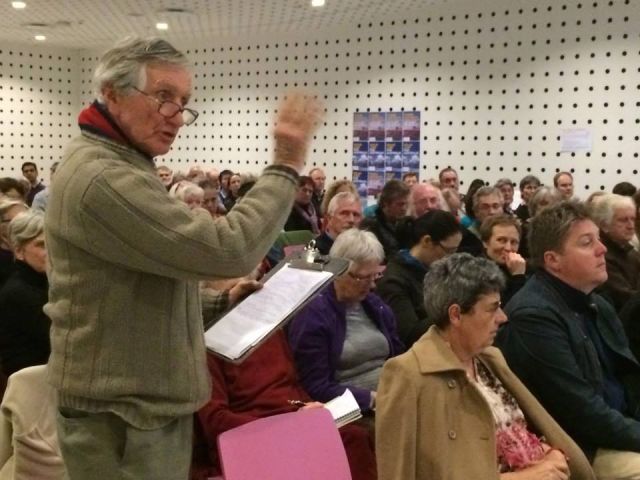
Under intense lobbying by big electricity companies, the Tony Abbott government is attempting to scrap the Renewable Energy Target (RET) which aims to have 20% of Australia’s electricity come from renewable energy sources by 2020.
In response to this threat, a new community group called Solar Citizens is campaigning to defend existing solar power and extend solar to even more households. They have held public meetings in Brisbane, Adelaide, Sydney and Melbourne.
A recent poll by the Climate Institute showed that 70% of Australians supported the current RET target and 60% supported a higher target.
A panel appointed by the government is reviewing the RET. Heading the panel is Dick Warburton, a climate sceptic.
Australians have embraced solar power and 1.3 million homes now have rooftop solar panels, covering 4 million voters. This has mushroomed in the last five years as the cost of solar panels has dropped from $36,000 about 20 years ago to about $3000 today for a three kilowatt system.
The number includes 260,000 homes in NSW alone, the majority in the country and regional areas. In Queensland and South Australia, about one quarter of all households have rooftop solar panels.
It’s a revolution in how energy is bought and sold.
One reason solar panels have proved popular is that the cost of electricity has risen 40% since 2010. The move to solar power has been so popular there is $1 billion of electricity not sold in Australia, putting the profits of privatised energy companies at risk.
Attempts have been made to stop residents switching to solar and no longer needing to buy their energy from private companies. The rebate from feeding solar power generated on the rooftop back into the electricity grid has now been slashed to nothing in most states.
In the May budget, the Abbott government also slashed the funding for the Emissions Reduction Fund from $2.25 billion to only $1.15 billion over the next four years. It was from this fund that the cost of adding solar panels to a homeowner’s roof was subsidised by about 20-30%.
The Coalition has also dropped its promise of providing a million solar panels to low-income households.
However the good news is that work has started on the construction of the first of two large-scale solar photovoltaic power plants in New South Wales.
The first, currently being built at Nyngan in central NSW, will be the largest solar farm in the southern hemisphere, producing 103 megawatts at peak capacity. This will be enough to power more than 33,000 average NSW homes.
It has been named the Solar Flagship program, and will also deliver another 50 megawatt plant at Broken Hill, providing a combined solar power output 10 times larger than anything previously built in Australia. Projects of similar size have already been built in Germany, Spain and California.
Consumers are very angry at the possibility the Coalition review will recommend the scrapping of all solar power rebates and subsidies. The electricity companies want to go further and are pushing for households with solar panel to be taxed for using the grid at night.
In response to this new threat, solar power owners are considering buying a battery to store energy, allowing them to go off the grid totally. At the moment, batteries cost about $5000 but as demand increases, the cost of this technology will come down.
Furthermore, people are discussing the possibility of giving their neighbours electricity from their solar panels, or setting up a local network of electricity supply for those whose rooftops are in shade.
The electricity distributors could be shooting themselves in the foot as renewable energy is so much cheaper than coal or oil and will not go away.